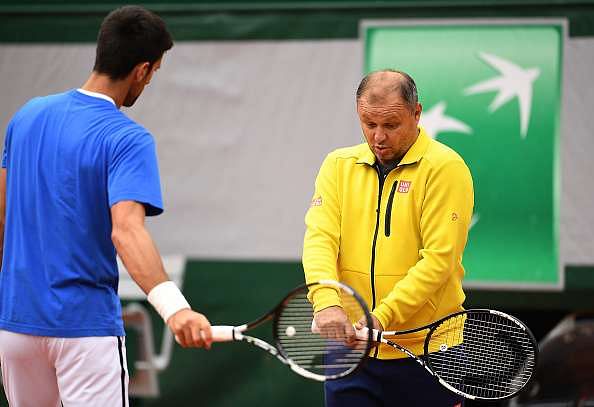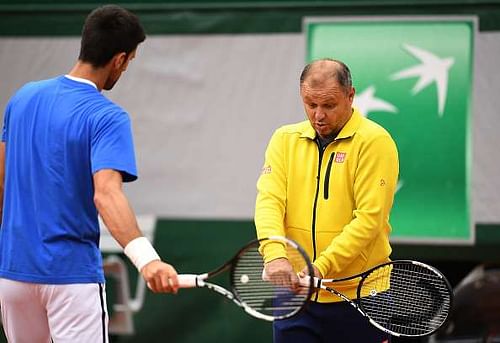
Novak Djokovic's coach, Marian Vajda, discusses his mental state, says Djokovic is a 'broken man'

Serbian ace Novak Djokovic has been with former No. 1 Boris Becker since 2014, and, if rumours are to be believed, will part ways with the German former No. 1 at the end of this season. But one man has been by Djokovic’s side since the beginning of his career – former Slovak professional Marian Vajda. A part of Djokovic’s core team, the 51-year-old was a successful Davis Cup player, and won two singles titles during his career in the late 1980s.
Vajda was appointed to be Djokovic’s primary coach in 2006, and retained that post until 2013, when Becker took up the role instead, but Vajda remained on the core coaching team.
In a recent interview with a Serbian news agency, Vajda spoke about Djokovic’s recently flagging form – and his appointment of controversial ‘love guru’ Pepe Imaz, who exercises a philosophy of ‘love and hugs’.
Djokovic has not won a tournament since the Montreal Masters, and saw a first-round exit at the Olympics shortly after. Since then, although the Serb has made the finals of the US Open, he lost in the finals to Stan Wawrinka, with Djokovic appearing to seriously struggle with stamina.
“Novak is not in crisis,” Vajda said in the interview. “Novak has won four consecutive Grand Slams – something only Rod Laver has achieved before him, on two separate occasions.”
“He put a lot of energy into this,” Vajda continued, “and by Paris (the Paris-Bercy Masters), he was totally drained.” The coach also suggested that Djokovic had seen a decline in concentration, and that fans “should have expected” this. “After so many years, and so many successes, it was natural,” he said, implying perhaps that the player has been suffering from some form of burnout over the year.
Djokovic, who over the course of his illustrious career so far has yet to add an Olympic gold medal to his trophy cabinet and this year saw a first-round exit at the hands of a resurgent Juan Martin del Potro, who would go on to win the silver medal. According to Vajda, Djokovic was ‘deeply affected’ by the Rio exit – which also saw him exit in the first round in the doubles – and that those losses had cast a pall over the remainder of the Serb’s season.
Although Vajda did not specifically talk about the “personal issues” that Djokovic has himself discussed earlier in the season, he said that the player was dealing with “some complex events” and described the fact that Djokovic made the finals of the US Open this year (where he would eventually lose the title to Swiss ace Stan Wawrinka) was “a miracle”.
On Pepe Imaz
Former tennis professional Pepe Imaz has become the latest addition to Djokovic’s crew, taking on the role of a life coach. The move has been seen by many as surprising, with Imaz regarded as somewhat of a quack for his philosophy of ‘love, peace and hugs.’
Read more: Djokovic brings on ‘love guru’ and life coach Pepe Imaz
But Vajda defended the decision, saying Djokovic felt “broken from all of the stress, and no longer wants to live that way. The only goal for him is to reduce stress through meditation.” He also suggested the pair had worked together in the past, saying they had “become close again after some time.”
Vajda also rubbished reports that Imaz was “mentally manipulating” Novak Djokovic, saying the Serb “no longer wants to be regarded as rich, famous and unbeatable” and just wanted a simpler life. “He just wants to be what he is,” Imaz said, drawing parallels with former World No. 1 Bjorn Borg, who suffered from severe burnout to retire at the age of 26.
“Borg’s blood pressure became unbearable, so he left at 26, and now Novak is at a point he is saying ‘OK, what now?’
Djokovic this year surmounted what was considered an impossible feat for him, winning the French Open – the only Grand Slam trophy missing from his cabinet, and thereby completing his Career Grand Slam.
Alluding to this, Vajda concluded with one damning statement: “When you have won everything, how to find a motive to continue?’